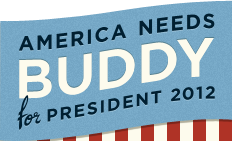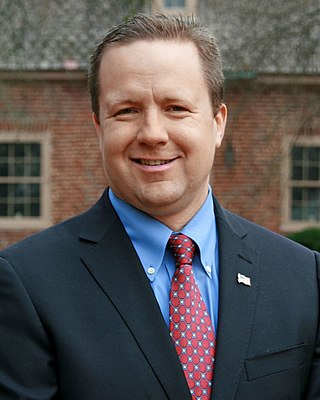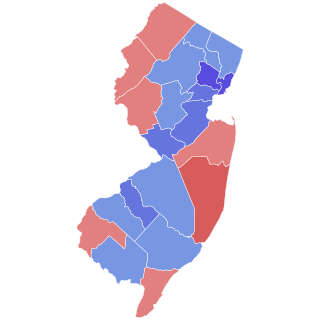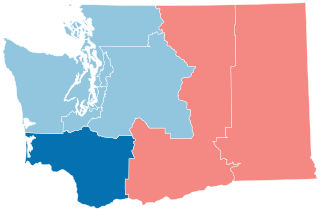Related Research Articles
American electoral politics have been dominated by successive pairs of major political parties since shortly after the founding of the republic of the United States. Since the 1850s, the two largest political parties have been the Democratic Party and the Republican Party—which together have won every United States presidential election since 1852 and controlled the United States Congress since at least 1856. Despite keeping the same names, the two parties have evolved in terms of ideologies, positions, and support bases over their long lifespans, in response to social, cultural, and economic developments—the Democratic Party being the left-of-center party since the time of the New Deal, and the Republican Party now being the right-of-center party.

The Bipartisan Campaign Reform Act of 2002, commonly known as the McCain–Feingold Act or BCRA, is a United States federal law that amended the Federal Election Campaign Act of 1971, which regulates the financing of political campaigns. Its chief sponsors were senators Russ Feingold (D-WI) and John McCain (R-AZ). The law became effective on 6 November 2002, and the new legal limits became effective on January 1, 2003.
A 527 organization or 527 group is a type of U.S. tax-exempt organization organized under Section 527 of the U.S. Internal Revenue Code. A 527 group is created primarily to influence the selection, nomination, election, appointment or defeat of candidates to federal, state or local public office.
New York is a Democratic stronghold and is considered one of the "Big Three" Democratic strongholds alongside California and Illinois. The following table indicates the party of elected officials in the U.S. state of New York:
In American politics, a conservative Democrat is a member of the Democratic Party with more conservative views than most Democrats. Traditionally, conservative Democrats have been elected to office from the Southern states, rural areas, the Rust Belt, and the Midwest. In 2019, the Pew Research Center found that 14% of Democratic and Democratic-leaning registered voters identify as conservative or very conservative, 38% identify as moderate, and 47% identify as liberal or very liberal.
In U.S. politics, an independent Democrat is an individual who loosely identifies with the ideals of the Democratic Party but chooses not to be a formal member of the party or is denied the Democratic nomination in a caucus or primary election. Independent Democrat is not a political party. Several elected officials, including members of Congress, have identified as independent Democrats.
The Opposition Party was a third party in the South in the years just before the American Civil War.

Party divisions of United States Congresses have played a central role on the organization and operations of both chambers of the United States Congress—the Senate and the House of Representatives—since its establishment as the bicameral legislature of the Federal government of the United States in 1789. Political parties had not been anticipated when the U.S. Constitution was drafted in 1787, nor did they exist at the time the first Senate elections and House elections occurred in 1788 and 1789. Organized political parties developed in the U.S. in the 1790s, but political factions—from which organized parties evolved—began to appear almost immediately after the 1st Congress convened. Those who supported the Washington administration were referred to as "pro-administration" and would eventually form the Federalist Party, while those in opposition joined the emerging Democratic-Republican Party.

From January 29 to June 4, 1996, voters of the Republican Party chose its nominee for president in the 1996 United States presidential election. Senator Bob Dole of Kansas, the former Senate majority leader, was selected as the nominee through a series of primary elections and caucuses culminating in the 1996 Republican National Convention held from August 12 to 15, 1996, in San Diego, California. Dole resigned from the Senate in June 1996 once he became the presumptive nominee to concentrate on his presidential campaign. He chose Jack Kemp as his running mate.

The 2012 presidential campaign of Buddy Roemer, 52nd Governor of Louisiana and former U.S. Representative of Louisiana began as a movement for the 2012 Republican Party nomination for President of the United States shortly following the 2010 midterm elections. After his exclusion from every nationally-televised Republican debate, Roemer announced on February 22, 2012 that he would instead pursue a place on a third-party ticket, specifically the Reform Party and Americans Elect nominations. Shortly after Americans Elect announced they would not be fielding a candidate, Roemer's campaign announced on May 31, 2012 that he was ending his 2012 presidential campaign altogether.

The 2018 United States Senate election in Virginia took place on November 6, 2018, to elect a member of the United States Senate to represent the Commonwealth of Virginia, concurrently with other elections to the U.S. Senate, elections to the United States House of Representatives, and various state and local elections. Incumbent Democratic Senator Tim Kaine, who had been his party's unsuccessful nominee for vice president two years earlier, was re-elected to a second term in office, winning this seat by the largest margin since 1988. This was the first election since 1994 that anyone had been re-elected to this seat.

The 2020 United States Senate election in New Jersey was held on November 3, 2020, to elect a member of the United States Senate to represent the State of New Jersey. It was held concurrently with the 2020 United States presidential election, as well as various other elections. The primary elections were moved from June 2, 2020, to July 7, 2020, due to COVID-19 pandemic concerns. Incumbent senator Cory Booker was first elected in a 2013 special election to complete the term of fellow Democrat Frank Lautenberg, who died in office.

Presidential primaries and caucuses of the Republican Party took place in many U.S. states, the District of Columbia, and five U.S. territories from February 3 to August 11, 2020, to elect most of the 2,550 delegates to send to the Republican National Convention. Delegates to the national convention in other states were elected by the respective state party organizations. The delegates to the national convention voted on the first ballot to select Donald Trump as the Republican Party's nominee for president of the United States in the 2020 election, and selected Mike Pence as the vice-presidential nominee.

The 2018 United States House of Representatives election in Delaware was held on November 6, 2018, to elect the U.S. representative from Delaware's at-large congressional district, who will represent the state of Delaware in the 116th United States Congress. The election coincided with the election of a U.S. Senator from Delaware and other federal and state offices. Democratic Congresswoman Lisa Blunt Rochester, the incumbent, won re-election.

The 2020 Green Party presidential primaries were a series of primary elections, caucuses and state conventions in which voters elected delegates to represent a candidate for the Green Party's nominee for President of the United States at the 2020 Green National Convention. The primaries, were held in numerous U.S. states on various dates from early spring into early summer of 2020, and featured elections publicly funded, concurrent with the Democratic Party and Republican Party primaries, and elections privately funded by the Green Party, held non-concurrently with the major party primaries.

Presidential primaries and caucuses are being held to select delegates to the 2024 Republican National Convention to determine the party's nominee for president in the 2024 United States presidential election. The Republican primaries and caucuses have taken place or will take place in all 50 U.S. states, the District of Columbia, and five U.S. territories between January and June 2024. The 2024 Republican National Convention is scheduled to be held in July at the Fiserv Forum in Milwaukee, Wisconsin.

The 2022 United States House of Representatives elections in Washington were held on November 8, 2022, to elect the 10 U.S. representatives from the state of Washington, one from each of the state's 10 congressional districts. The elections coincided with other elections to the House of Representatives, elections to the United States Senate and various state and local elections. Going into this election, the Democratic Party represented seven seats, while the Republican Party represented three seats.

The 2024 United States House of Representatives elections in New Jersey will be held on November 5, 2024, to elect the twelve U.S. representatives from the State of New Jersey, one from all twelve of the state's congressional districts. The elections will coincide with the 2024 U.S. presidential election, as well as other elections to the House of Representatives, elections to the United States Senate, and various state and local elections. The primary elections are scheduled for June 4, 2024.

The 2024 United States House of Representatives elections in New York will be held on November 5, 2024, to elect the 26 U.S. representatives from the State of New York, one from each of the state's 26 congressional districts. The elections will coincide with the 2024 U.S. presidential election, as well as other elections to the House of Representatives, elections to the United States Senate, and various state and local elections. The primary elections are scheduled for June 25, 2024.

The 2024 United States House of Representatives elections in North Carolina will be held on November 5, 2024, to elect the fourteen U.S. representatives from the State of North Carolina, one from all fourteen of the state's congressional districts. The elections will coincide with the 2024 U.S. presidential election, as well as other elections to the House of Representatives, elections to the United States Senate, and various state and local elections. The primary elections took place on March 5, 2024.
References
- ↑ Mark J. Rozell; Ted G. Jelen (2015). American Political Culture: An Encyclopedia vol 3. ABC-CLIO. pp. 207–9. ISBN 978-1-61069-378-3.
- ↑ "Home". February 2, 2012. Retrieved April 12, 2019.
Entities organized under section 527 of the tax code are considered "political organizations," defined generally as a party, committee or association that is organized and operated primarily for the purpose of influencing the selection, nomination or appointment of any individual to any federal, state or local public office, or office in a political organization. All political committees that register and file reports with the FEC are 527 organizations, but not all 527 organizations are required to file with the FEC. Some file reports with the Internal Revenue Service (IRS).
- ↑ "ABOUT" . Retrieved April 12, 2019.
- ↑ "Our Campaigns" . Retrieved 2020-09-17.
- ↑ "Our Campaigns" . Retrieved 2020-09-17.
- ↑ "McCann launches Conservative Party bid for Illinois governor". Herald-Whig. April 19, 2018. Retrieved April 12, 2019.
- ↑ Garcia, Rick Pearson, Monique. "Republican McCann gets in the governor race as third-party candidate, possibly complicating Rauner's re-election bid". chicagotribune.com. Retrieved April 12, 2019.
{{cite web}}: CS1 maint: multiple names: authors list (link) - ↑ Reform, Illinois Campaign for Political. "Conservative Party of Illinois". Illinois Sunshine. Retrieved April 12, 2019.
- ↑ "Conservative party nominee for Illinois governor: Sam McCann" . Retrieved April 12, 2019.
- ↑ "New Jersey Conservative Party" . Retrieved April 12, 2019.
- ↑ "Statewide Voter Registration Summary" (PDF). New Jersey Department of State, Division of Elections. February 28, 2019. Retrieved April 12, 2019.
- ↑ "History". Conservative Party of New York. Retrieved April 12, 2019.
- ↑ Michael Perman (2004). The Road to Redemption: Southern Politics, 1869-1879. U of North Carolina Press. pp. 151–53.
- ↑ Sheldon Hackney (2005). Magnolias Without Moonlight: The American South From Regional Confederacy To National Integration . Transaction. p. 30.